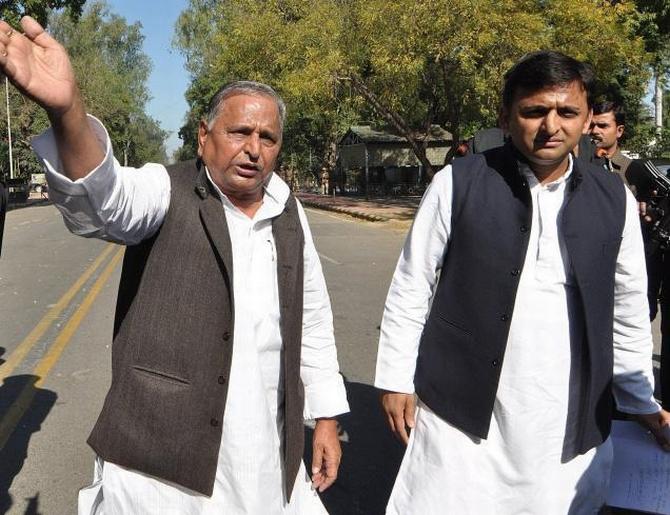Akhilesh was always seen as someone working under the shadow of his father and uncles. However, overtime, he started asserting his authority, say Virendra Singh Rawat and Amit Agnihotri.

Even as the ruling Samajwadi Party in Uttar Pradesh is preparing to celebrate its silver jubilee on November 5 in Lucknow, indications are the party might split before the event with the warring factions hardening their stand.
The latest crisis has come with Chief Minister Akhilesh Yadav removing his uncle Shivpal Singh Yadav and three other ministers from the state cabinet on Sunday.
The unexpected move was seen as an open challenge to not only Shivpal but party chief Mulayam Singh Yadav, too. Following this, the party announced expulsion of general secretary Ramgopal Yadav for six years for openly siding with Akhilesh and writing two terse letters to Mulayam over the feud.
With 2017 polls less than five months away, the infighting can affect the poll prospects of the SP. The rift has been widening over the past few months with Shivpal saying some officials were not heeding his directives and causing impediments in development projects. The jibe was seen as directed at the CM, who controlled the senior officials of the government.
The fault lines in the party had started emerging prominently after the 2014 Lok Sabha polls, which reduced its tally to five from the 23 seats it had won in the 2009 elections.
Following this debacle, there were calls for Mulayam to take over as CM and sack Akhilesh. However, Mulayam chose to back Akhilesh, while some other party leaders were removed from prominent positions over the poor show in elections.
Akhilesh was always seen as someone working under the shadow of his father and uncles. However, overtime, he started asserting his authority over projects, postings, party hierarchy, etc, causing heartburn among the old guards represented by Mulayam and Shivpal.
On September 12, Akhilesh removed two powerful cabinet ministers -- Gayatri Prasad Prajapati and Raj Kishore Singh.
The next day, he removed chief secretary Deepak Singhal, considered close to Shipval.
Akhilesh even divested Shivpal of key portfolios, including people’s works department and irrigation, after Mulayam replaced Akhilesh with Shivpal as SP’s state unit president.
Soon after, Shivpal tendered his resigning from the state cabinet and party posts. There was public acrimony at the Lucknow party office by the respective supporters of Akhilesh and Shivpal, who indulged in shrill slogan-shouting, causing huge embarrassment to the party.
Mulayam intervened and Prajapti was re-inducted into the cabinet on September 26, while Shivpal continued to be the party’s UP president.
On October 1, Akhilesh stripped Shivpal of two of his other portfolios -- social welfare and minor irrigation -- and allotted these to other ministers.
On June 21, Shivpal had announced the merger of the two parties in the presence of Quami Ekta Dal president Afzal Ansari, the elder brother of incarcerated mafia don and legislator Mukhtar Ansari. However, Akhilesh opposed it and the SP parliamentary board reportedly called off the decision.
Now, Shivpal says the QED merger has become effective and that there is no need for a fresh announcement.
Further, Shivpal has nominated his key aides in the 81-member SP state executive, while showing the door to those who are close to Akhilesh.
On October 14, replying to a reporter’s question on the CM candidate for the upcoming election, Mulayam said the party’s parliamentary board and legislators would chose the person, in the event of SP securing majority in the assembly election.
Soon, SP national vice president Kironmoy Nanda announced Akhilesh remained the party’s official chief ministerial candidate for the 2017 polls. He claimed Mulayam was only referring to the procedure of electing the CM, when a scribe asked that specific question.
The rift in the party is too deep to be mended, say political observers. Besides, the party is now perceived weaker in comparison to the Bharatiya Janata Party and the Bahujan Samaj Party. It threatens to derail the election campaign of SP, which is faced with anti-incumbency, apart from stiff challenge from both the BJP and BSP.
Akhilesh has now decided to kick-start his ‘Samajwadi Vikas Rath Yatra’ from November 3 and it is speculated that he would stay away from the party’s silver jubilee celebrations as well.
Meanwhile, the Congress is closely watching the developments in Uttar Pradesh and feels that a split in the SP could benefit it. According to Congress leaders, its rivals in the state -- SP and BSP -- gained at its expense over the past two decades.
“If the graph of either SP or the BSP goes down, it is a positive development for the Congress,” party veteran in the state Rajaram Pal said. “If the SP breaks up, its core Muslim votes might look for a new anchor. Some of them may like to come back to the Congress as the BSP under Mayawati, too, is facing internal problems,” said Pal, who was made the UP Congress vice president recently.
Muslims, Dalits and Brahmins used to be the traditional vote bank of the Congress in UP and gradually moved to its rivals as the Congress was pushed to the margins in the years after the 1992 Babri mosque demolition.
Party managers also feel that part of the Brahmin and other upper caste voters, who had been voting for the BJP, might also come back.
The party’s strategy in UP is to keep the BJP out of power. Towards this goal, the Congress is trying its best to increase its tally in the state assembly (it won just 28 of the 403 seats in 2012 polls), so that it is in a position to play a role in the formation of the next government.
“The Congress, in that case, might support the BSP or the SP to keep the BJP out,” said a senior party leader.











